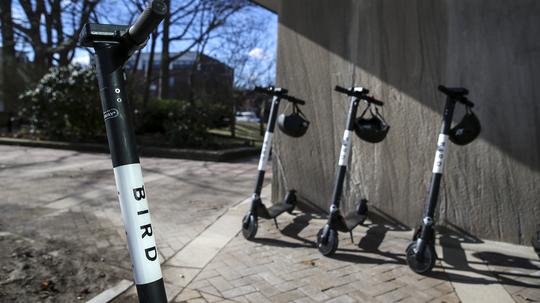
After more than two years of major U.S. cities experimenting with dockless scooters, Chicago is finally launching its own scooter pilot program this summer.
On Wednesday, Chicago’s Department of Business Affairs and Consumer Protection and Department of Transportation announced the four-month pilot program, which will bring up to 3,500 scooters to the city's West and Northwest Sides on June 15.
The pilot zone will be bounded by Halsted Street and the Chicago River on the east, Irving Park Road on the north, the city’s boundary and Harlem Avenue on the west, and the Chicago River on the south. Neighborhoods covered in the pilot include Austin, Avondale, Pilsen and South Lawndale.
To determine exactly which scooter companies will be operating in the pilot, the city is asking interested vendors to apply for permits. California-based scooter companies Bird and Lime both confirmed to Chicago Inno that they plan to apply for a permit. Other likely candidates include Uber Jump and Lyft.
"We very much look forward to demonstrating how Bird's success and unparalleled experience as a shared e-scooter operator can help city officials fulfill their promise of making Chicago a world-class leader in transportation," said Bird spokesperson Mackenzie Long in a statement to Chicago Inno.
The decision to launch the pilot was made based on recommendations from the city’s Transportation and Mobility Task Force that Mayor Rahm Emanuel announced in September. Just last month, the task force released a report detailing how the new scooter pilot should operate, in addition to plans for expanding dockless bike programs and launching an autonomous vehicle pilot.

The new scooter pilot will help city regulators assess how well the method of transportation serves Chicago’s residents and visitors, with safety, equity and sustainability being key topics to be measured.
“This pilot program will allow the city and its residents to better understand how electric, shared scooters impact the city,” said BACP Commissioner Rosa Escareno in a statement. “We have engaged with advocates, community groups, business groups and elected officials within the pilot area, and look forward to working closely with residents to evaluate the program.”
Chicago has taken a more cautious approach to scooters compared to other cities around the country, as bigger cities face unique challenges when it comes to scooters operating in dense urban areas.
One major concern has been how to organize them and minimize sidewalk clutter when they’re not in use. To address the issue, the pilot’s terms require scooters to be parked upright and parallel to the sidewalk, and away from street corners, bus stops and buildings.
To ensure the scooters are used safely, they are prohibited from operating on sidewalks and will be limited to a maximum of 15 miles per hour, according to the pilot's terms. Additionally, scooters will only be available for use from 5 a.m. to 10 p.m. Every night, scooter operators will be required to remove them from the streets.
If people see scooters being misused in any way, the city says they should contact the scooter vendors directly. Vendors will have two hours to retrieve and move improperly parked scooters.
Throughout the pilot, which ends October 15, scooter companies will provide real-time and continuous data on operations, ridership and safety to the city as it determines whether the scooters should become a regular part of the city’s transportation landscape.
The pilot's far west and north side zones have been identified as priority areas, where at least 25 percent of the scooters must be placed every morning. The city says it chose these particular areas because they are not widely serviced by Divvy bikes, Chicago's shared-bike program.
“The city is committed to improving transportation access, reducing single-occupancy vehicle use, and providing first- and last-mile solutions to support public transit,” said CDOT Commissioner Rebekah Scheinfeld in a statement. “This program is designed to test how scooters as a mobility option can support these goals and to evaluate the impact of the technology on Chicagoans.”
The city’s scooter pilot approach is similar to how it addressed dockless bikes last summer when it launched a pilot to test them on the city’s South Side. Dockless bike operators, such as Lime, Uber Jump and Pace, participated. Once the pilot ended, officials gathered data about riders’ experiences in a survey, but it is still unclear whether the bikes will ever become permanently available in Chicago.








